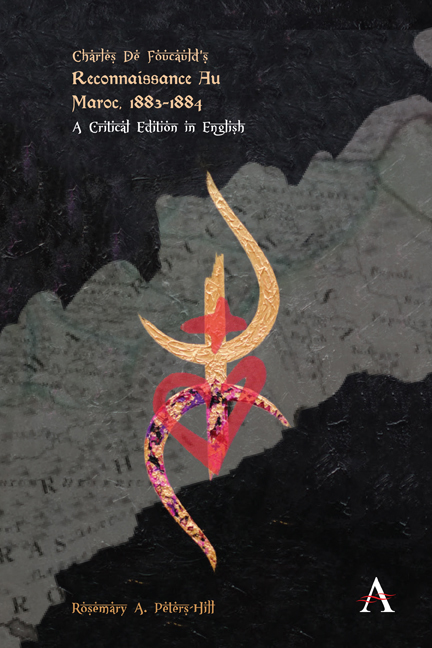Book contents
- Frontmatter
- Contents
- List of Figures
- Acknowledgments
- “There are no roads”: Charles de Foucauld’s Reconnaissance au Maroc—a Critical Introduction
- Charles de Foucauld, Reconnaissance au Maroc, 1883–1884
- Letter to François de Bondy
- Introduction
- Avant-Propos
- I Tangiers to Meknès
- II Meknès to Qaçba Beni Mellal
- III Qaçba Beni Mellal to Tikirt
- IV Tikirt to Tissint
- V Sojourn in the Sahara
- VI Tissint to Mogador
- VII Mogador to Tissint
- VIII Tissint to the Dadès
- IX The Dadès to Qçabi ech Cheurfa
- X Qçabi ech Chorfa to Lalla Maghnia
- Appendix: The Jews of Morocco
- Note on the Materials Used to Draw Up My Itinerary
- Report Delivered to the Société de Géographie de Paris in Its General Session of 24 April 1885
- “Itineraries in Morocco”
- Afterwards: An Afterword
- Glossary of Terms
- Bibliography
- Index
Afterwards: An Afterword
Published online by Cambridge University Press: 20 January 2022
- Frontmatter
- Contents
- List of Figures
- Acknowledgments
- “There are no roads”: Charles de Foucauld’s Reconnaissance au Maroc—a Critical Introduction
- Charles de Foucauld, Reconnaissance au Maroc, 1883–1884
- Letter to François de Bondy
- Introduction
- Avant-Propos
- I Tangiers to Meknès
- II Meknès to Qaçba Beni Mellal
- III Qaçba Beni Mellal to Tikirt
- IV Tikirt to Tissint
- V Sojourn in the Sahara
- VI Tissint to Mogador
- VII Mogador to Tissint
- VIII Tissint to the Dadès
- IX The Dadès to Qçabi ech Cheurfa
- X Qçabi ech Chorfa to Lalla Maghnia
- Appendix: The Jews of Morocco
- Note on the Materials Used to Draw Up My Itinerary
- Report Delivered to the Société de Géographie de Paris in Its General Session of 24 April 1885
- “Itineraries in Morocco”
- Afterwards: An Afterword
- Glossary of Terms
- Bibliography
- Index
Summary
For years I have been writing this book and writing this book, and never yet feeling ready to send it off, for fear some huge omission or error would make the whole project invalid. And now, at the point of almost-publication, after rereading and rewriting this book, I hesitate to close this final chapter—because there is so much more to say about Foucauld, about Morocco, about colonialism, about travel writing, about translation, about national and ethnic and cultural and subjective identities. And none of those things can be contained in a book, certainly not in just one.
Some can't be found in books at all. As a colleague once told me, “Morocco is not the country of archives.” What I discovered while living in Rabat is that “archive,” like “reconnaissance,” is always plural with multiple possible interpretations. And not all sit in acid-free boxes, carefully numbered and catalogued. Some exist in other forms, more malleable and subjective than paper documentation. As I worked my way from Tangier to Meknès, Tissint to Mogador, Qçabi ech Chorfa to Lalla Maghnia, I collected details about this world that had so infused Foucauld he had begun to radiate its character. I turned to a variety of sources— books and articles, photo collections, manuscripts, correspondence, maps, encyclopedias, concordances; biographies, historical studies of North Africa, religious writings; Arabic manuals, Hebrew manuals, historic dictionaries; doctoral theses from three continents, privately published accounts and New York Times best-sellers, magazines, journals, newspapers, blogs … Because if Morocco is not the country of archives, it is a country of memories, and memories keep in different ways and different languages (verbal, visual, musical, gestural). I have delighted in Internet sites that showcase collections of old postcards of Casablanca, or Jewish wedding processions from the nineteenth century, or snake-charming—rituals? performances?— in sun-dusted medina streets. Stern-faced brides with heavy embroidery elongating their necks. Cobras leering upward from sinewed wrists that already boast more than a few scars. Stiff-backed French soldiers in a neat regiment, marching through a Cartesian garden while palm fronds sway on either side.
- Type
- Chapter
- Information
- Charles de Foucauld’s Reconnaissance au Maroc, 1883–1884A Critical Edition in English, pp. 413 - 416Publisher: Anthem PressPrint publication year: 2020

